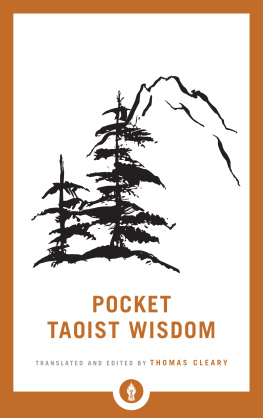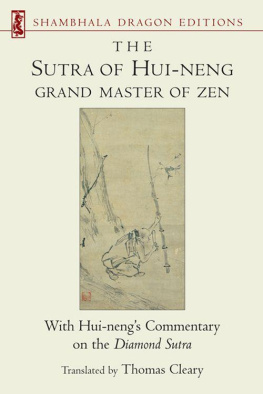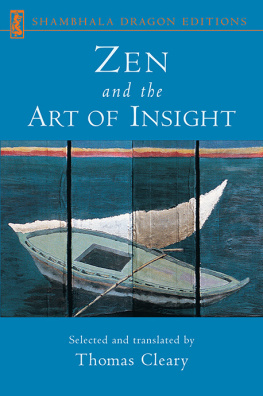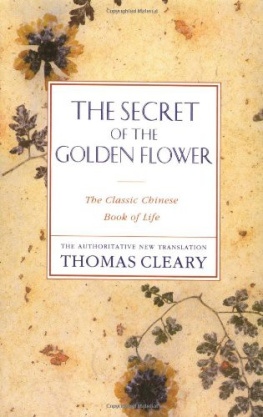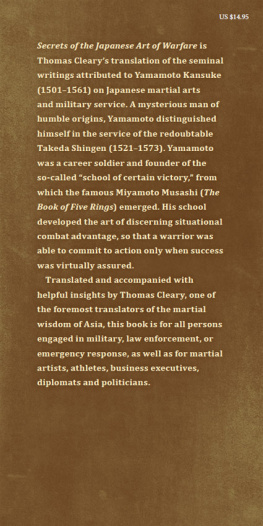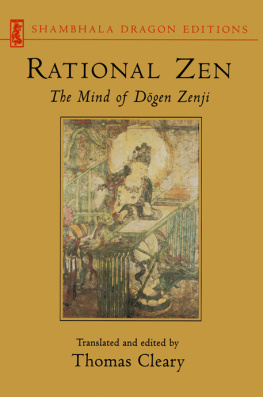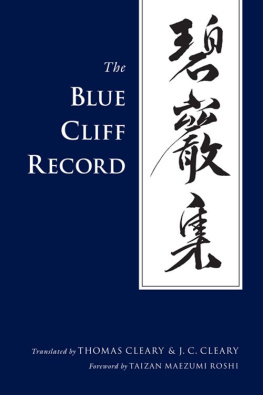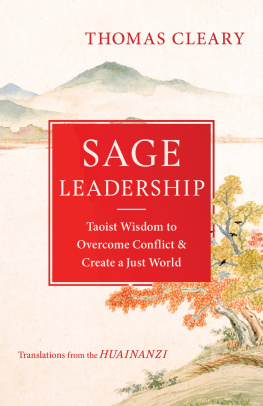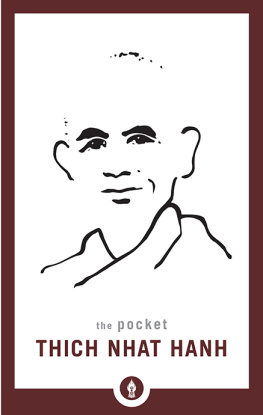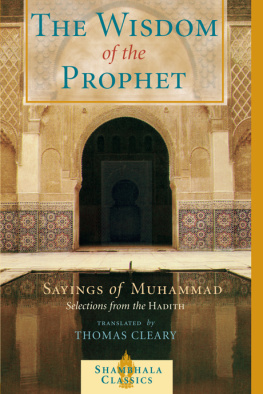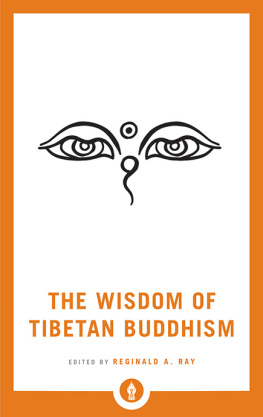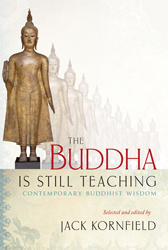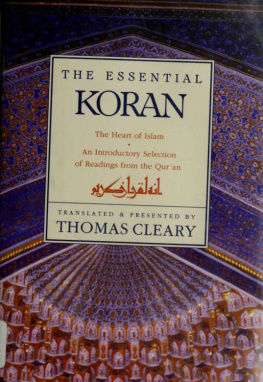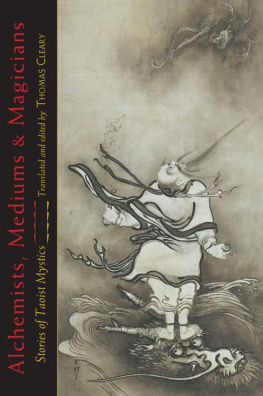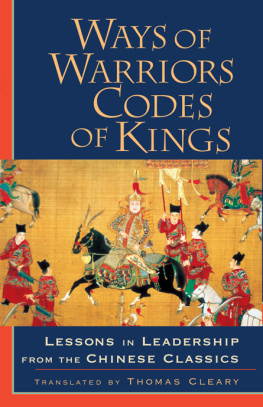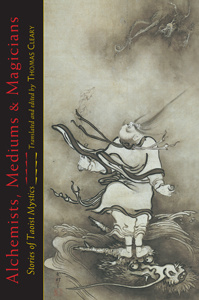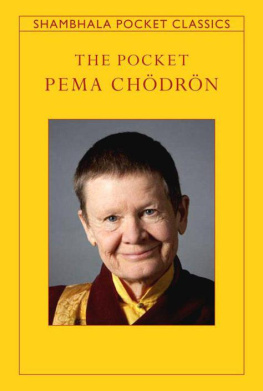Thomas Cleary - Pocket Taoist Wisdom (Shambhala Pocket Library)
Here you can read online Thomas Cleary - Pocket Taoist Wisdom (Shambhala Pocket Library) full text of the book (entire story) in english for free. Download pdf and epub, get meaning, cover and reviews about this ebook. year: 2019, publisher: Shambhala, genre: Religion. Description of the work, (preface) as well as reviews are available. Best literature library LitArk.com created for fans of good reading and offers a wide selection of genres:
Romance novel
Science fiction
Adventure
Detective
Science
History
Home and family
Prose
Art
Politics
Computer
Non-fiction
Religion
Business
Children
Humor
Choose a favorite category and find really read worthwhile books. Enjoy immersion in the world of imagination, feel the emotions of the characters or learn something new for yourself, make an fascinating discovery.
- Book:Pocket Taoist Wisdom (Shambhala Pocket Library)
- Author:
- Publisher:Shambhala
- Genre:
- Year:2019
- Rating:5 / 5
- Favourites:Add to favourites
- Your mark:
- 100
- 1
- 2
- 3
- 4
- 5
Pocket Taoist Wisdom (Shambhala Pocket Library): summary, description and annotation
We offer to read an annotation, description, summary or preface (depends on what the author of the book "Pocket Taoist Wisdom (Shambhala Pocket Library)" wrote himself). If you haven't found the necessary information about the book — write in the comments, we will try to find it.
Pocket Taoist Wisdom (Shambhala Pocket Library) — read online for free the complete book (whole text) full work
Below is the text of the book, divided by pages. System saving the place of the last page read, allows you to conveniently read the book "Pocket Taoist Wisdom (Shambhala Pocket Library)" online for free, without having to search again every time where you left off. Put a bookmark, and you can go to the page where you finished reading at any time.
Font size:
Interval:
Bookmark:
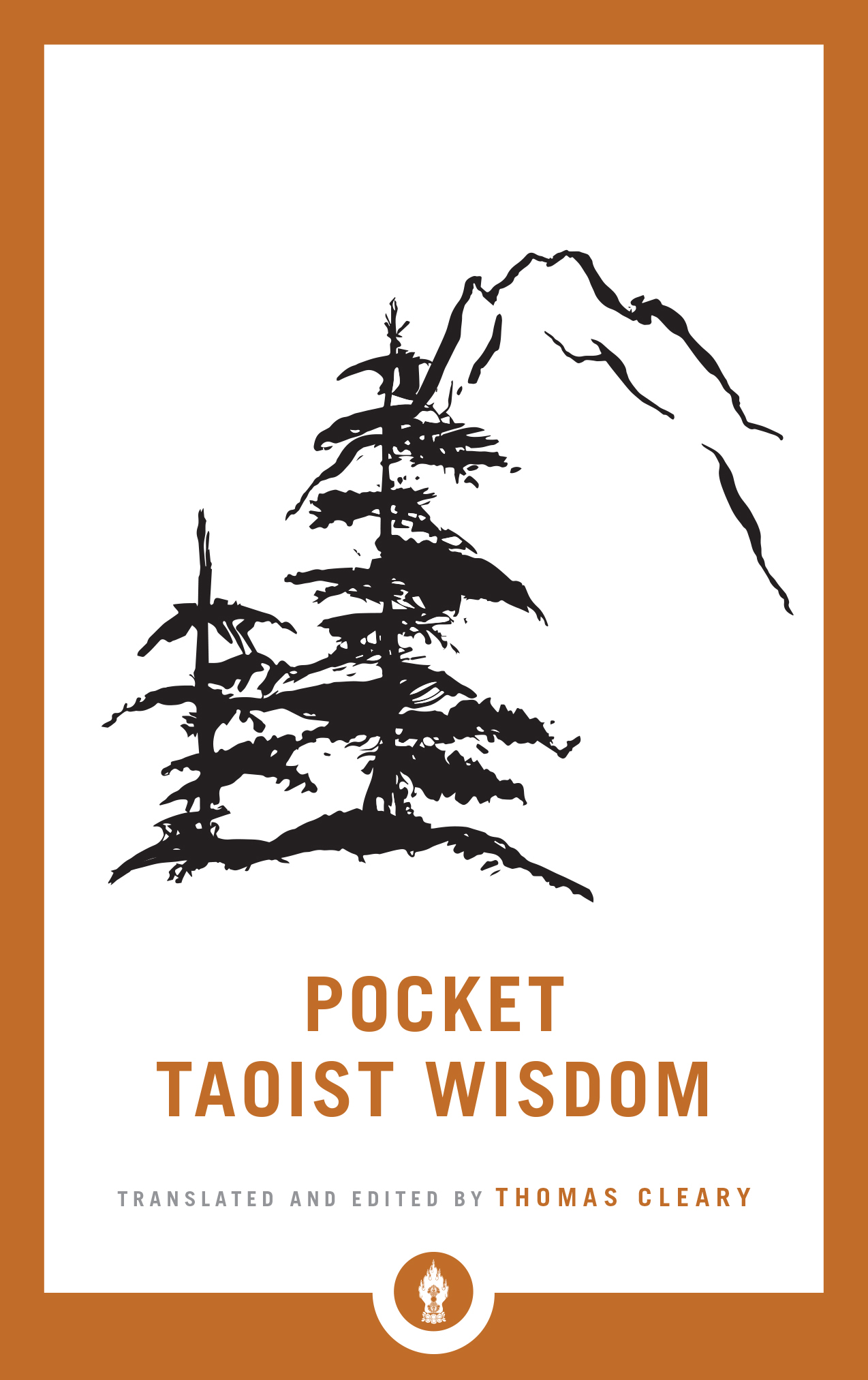
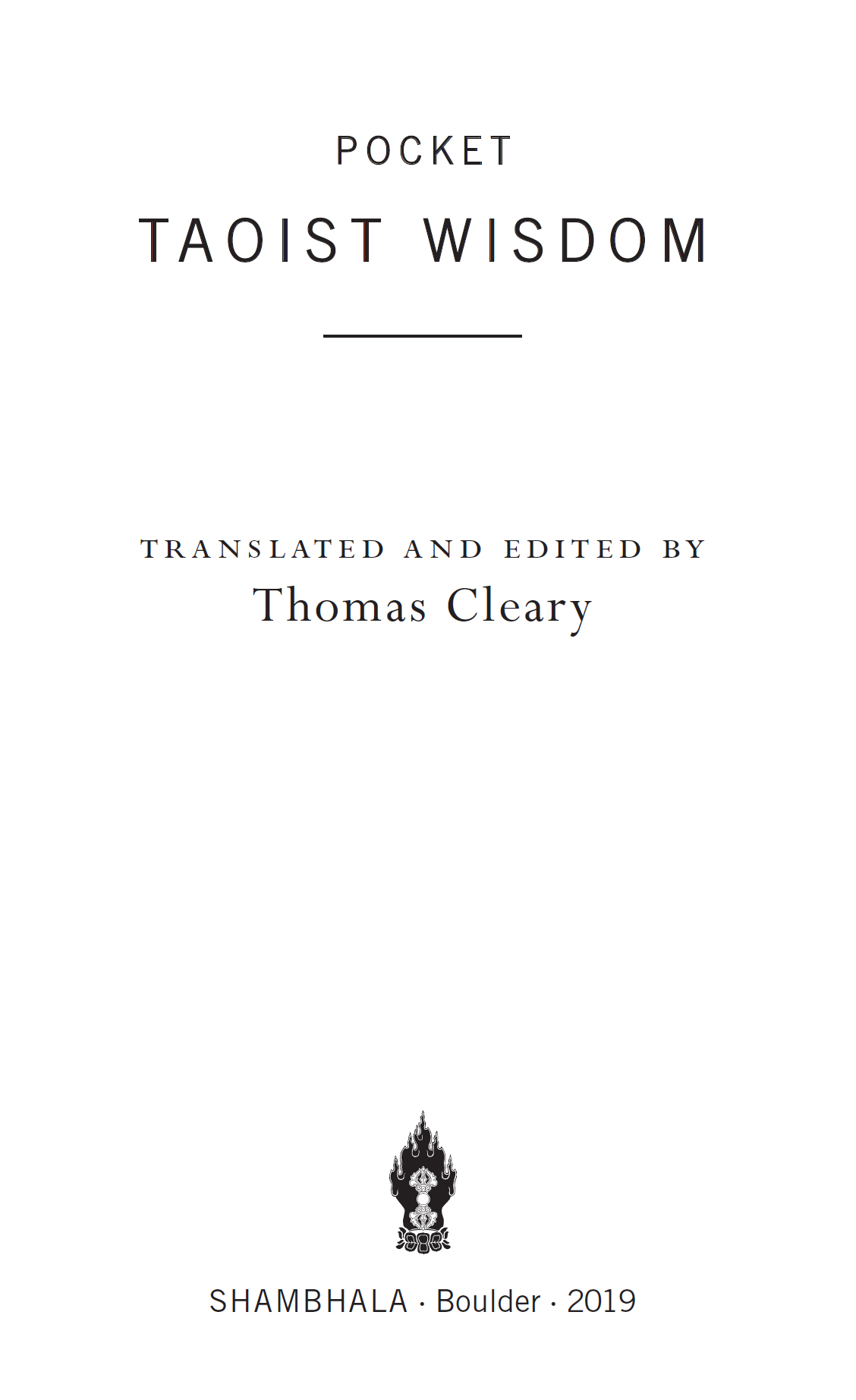
S HAMBHALA P UBLICATIONS , I NC .
4720 Walnut Street
Boulder, Colorado 80301
www.shambhala.com
1991, 1993 by Thomas Cleary
This book was previously published as The Spirit of Tao and The Taoism Reader.
All rights reserved. No part of this book may be reproduced in any form or by any means, electronic or mechanical, including photocopying, recording, or by any information storage and retrieval system, without permission in writing from the publisher.
Cover art by Robert Spellman
Cover design by Jim Zaccaria
L IBRARY OF C ONGRESS C ATALOGING - IN -P UBLICATION D ATA
Names: Cleary, Thomas F., 1949 translator, editor.
Title: Pocket Taoist wisdom/translated and edited by Thomas Cleary.
Other titles: The Spirit of Tao. Description: Boulder: Shambhala, 2019.
| Series: Shambhala pocket library | This book was previously published as The Spirit of Tao and The Taoism Reader. | Includes bibliographical references.
Identifiers: LCCN 2018052880 | ISBN 9781611806946 (pbk.: alk. paper)
eISBN 9780834842328
Subjects: LCSH : TaoismSacred booksQuotations.
Classification: LCC BL 1920 S69 2019 | DDC 299.5/1482dc23
LC record available at https://lccn.loc.gov/2018052880
v5.4
a
Tao-te Ching
The Tao-te Ching is the most widely read of Taoist texts and the most universally accepted by followers of all Taoist orders. It has been dated variously, with estimates generally ranging from around 500 to 300 B . C . E . Although it is conventionally attributed to Lao-tzu, a semilegendary ancestor of Taoism, the Tao-te Ching is evidently not an original composition by an individual author, but contains redactions of even more ancient lore. In any case, it is one of the earliest sources of Taoist theory and praxis. The present anthology includes several key selections from the classic illustrating these teachings.
Chuang-tzu
The next great Taoist classic after the Tao-te Ching is the equally famous Chuang-tzu, or Book of Master Chuang, attributed to the philosopher Chuang-tzu, or Chuang Chou (ca. 369286 B . C . E .). Although it elaborates on many of the ideas of the Tao-te Ching, the Chuang-tzu is very different in its transmission and manner of presentation. Whereas the former text consists of proverbs and aphorisms, the latter is largely made up of allegorical stories interspersed with philosophical discussions. The Tao-te Ching, closely linked to ancient tradition, is attributed to a semilegendary sage and is very difficult to place historically with precision; the Chuang-tzu, on the other hand, is attributed to a clearly historical personage, and the marks of its time, during which the chaos and violence of the Warring States era rose inexorably toward a climax, are quite evident in the psychological mood and philosophical attitude of the text.
Huai-nan-tzu
The next great Taoist classic after Chuang-tzu is the Huai-nan-tzu (Huainanzi), or Masters of Huai-nan, composed approximately 150 years later in a very different social and political climate. Centuries of civil war had ended around 200 B . C . E . with the founding of the monumental Han dynasty, which was to rule China for the next four hundred years, with but a brief interruption in the early part of the first century C . E . Although the later impact of Buddhism was so great as to be immeasurable, nevertheless the culture of the Han dynasty left an indelible imprint, exerting a lasting influence on the development of Chinese civilization.
The early emperors of Han adopted a Taoist policy of minimalist government in order to allow the nation and its people to recover from the violence and destruction of the long era of Warring States. China had been united into an empire under the militaristic Chin dynasty in the middle of the third century B . C . E .; taking over from the Chin, the Han dynasty attempted to restore classical culture, which had been suppressed by the Chin government in favor of a mechanical form of legalism. One of the great patrons of this revival was Liu An, a grandson of the founding Han emperor and king of a small feudal domain. Known as the king of Huai-nan after the region where his fief was at one time located, Liu An opened his court to scholars and savants from all over the empire, developing it into a major center of learning and culture.
According to legend, the classic Huai-nan-tzu is the product of an inner circle of eight Taoist sages at Liu Ans court. This group of wizards is said to have appeared at court when it was already in full bloom as a seat of arts and sciences. Challenged by the king to demonstrate knowledge not already represented at his illustrious court, the eight ancients proceeded to astound him with uncanny displays of occult powers. Duly humbled, the king of Huai-nan welcomed the sages and apprenticed himself to them. The Huai-nan-tzu purports to be records of their talks.
Because of the historical circumstances of its origin, the Huai-nan-tzu contains a great deal of material relating to political science and affairs of state; but it also synthesizes other aspects of Taoism, including natural and spiritual sciences. In this respect it is the richest of the early Taoist classics. The dissemination of these teachings was inhibited, however, by two events: the downfall and disappearance of Liu An, victim of an intrigue; and the official adoption of a form of Confucianism as the orthodox system of thought and education throughout the empire. The brand of Confucianism that won the imperial stamp of approval was really a hybrid of Confucianism, legalism, and a peculiar cosmology that revived the ancient doctrine of the divine right of kings and bestowed on it the dignity and authority of natural law.
Thus, the liberal, egalitarian idealism of the Taoist Huai-nan masters was eclipsed by the imperial ideology of political despotism and intellectual conform-ism. Nevertheless, the essential vitality, energy, and spirit of Taoism remained stored within its own secret reservoirs in spite of external barriers to its effective application on a large scale: as the Huai-nan masters themselves said, To blame the Way for not working in a polluted world is like tying a unicorn down from two sides and yet expecting it to run a thousand miles. The teachings of the Huai-nan-tzu may not have had the social and political impact that could have been possible under more favorable conditions, but they retained incalculable value as a basic resource for Taoist principles and practices.
Although the Huai-nan-tzu follows the Tao-te Ching and the Chuang-tzu in its fundamental understanding of human nature and life, because of the historical circumstances of its composition, it is more positive and constructive than either of its great predecessors, especially the Chuang-tzu.
Wen-tzu
After the downfall of Liu An, the disappearance of the Huai-nan masters, and the establishment of Confucian orthodoxy in the second century B . C . E ., the classical Taoist tradition of the Tao-te Ching, the Chuang-tzu, and the Huai-nan-tzu went underground. There remained considerable private interest in Taoism among the Confucian intelligentsia, but over the course of the Han dynasty their Taoism became mixed with superstitions and mechanical thought systems characteristic of hybrid Han Confucianism. Among Taoist purists, it is said that so-called Real People, or true Taoist adepts, went into hiding during the Han dynasty and did not reemerge for hundreds of years.
Font size:
Interval:
Bookmark:
Similar books «Pocket Taoist Wisdom (Shambhala Pocket Library)»
Look at similar books to Pocket Taoist Wisdom (Shambhala Pocket Library). We have selected literature similar in name and meaning in the hope of providing readers with more options to find new, interesting, not yet read works.
Discussion, reviews of the book Pocket Taoist Wisdom (Shambhala Pocket Library) and just readers' own opinions. Leave your comments, write what you think about the work, its meaning or the main characters. Specify what exactly you liked and what you didn't like, and why you think so.

